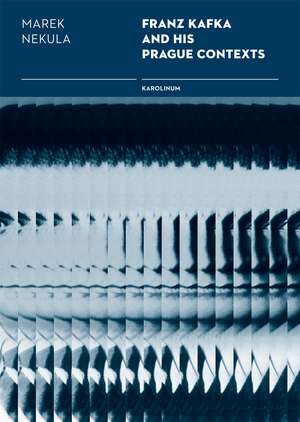Franz Kafka and His Prague Contexts – Studies on Language and Literature
Autor Marek Nekulaen Limba Engleză Paperback – 23 mai 2016
Franz Kafka is by far the Prague author most widely read and admired internationally. However, his reception in Czechoslovakia, launched by the Liblice conference in 1963, has been conflicted. While rescuing Kafka from years of censorship and neglect, Czech critics of the 1960s “overwrote” his German and Jewish literary and cultural contexts in order to focus on his Czech cultural connections. Seeking to rediscover Kafka’s multiple backgrounds, in Franz Kafka and His Prague Contexts Marek Nekula focuses on Kafka’s Jewish social and literary networks in Prague, his German and Czech bilingualism, and his knowledge of Yiddish and Hebrew. Kafka’s bilingualism is discussed in the context of contemporary essentialist views of a writer’s “organic” language and identity. Nekula also pays particular attention to Kafka’s education, examining his studies of Czech language and literature as well as its role in his intellectual life. The book concludes by asking how Kafka “read” his urban environment, looking at the readings of Prague encoded in his fictional and non-fictional texts.
Preț: 198.63 lei
Preț vechi: 230.29 lei
-14% Nou
Puncte Express: 298
Preț estimativ în valută:
38.01€ • 41.28$ • 31.93£
38.01€ • 41.28$ • 31.93£
Carte indisponibilă temporar
Doresc să fiu notificat când acest titlu va fi disponibil:
Se trimite...
Preluare comenzi: 021 569.72.76
Specificații
ISBN-13: 9788024629353
ISBN-10: 8024629356
Pagini: 300
Dimensiuni: 169 x 234 x 14 mm
Greutate: 0.4 kg
Editura: Karolinum Press, Charles University
ISBN-10: 8024629356
Pagini: 300
Dimensiuni: 169 x 234 x 14 mm
Greutate: 0.4 kg
Editura: Karolinum Press, Charles University
Notă biografică
Marek Nekula is professor of Slavic languages and literatures at the University of Regensburg, Germany. He is the author, in German, of Franz Kafkas Sprachen.
Cuprins
Foreword
Suppression and distortion: Franz Kafka ‘from the Prague perspective’
The ‘being’ of Odradek: Franz Kafka in his Jewish context
Franz Kafka’s languages
Kafka’s ‘organic’ language: Language as a weapon
Franz Kafka at school: Kafka’s education in Czech language and literature
Kafka’s Czech reading in context
Divided city: Franz Kafka’s reading of Prague
Bibliography
Index
Editorial note
Suppression and distortion: Franz Kafka ‘from the Prague perspective’
The ‘being’ of Odradek: Franz Kafka in his Jewish context
Franz Kafka’s languages
Kafka’s ‘organic’ language: Language as a weapon
Franz Kafka at school: Kafka’s education in Czech language and literature
Kafka’s Czech reading in context
Divided city: Franz Kafka’s reading of Prague
Bibliography
Index
Editorial note
Recenzii
"Being sharply aware of the polyphonic character of Kafka’s texts, Nekula does not offer these as exclusive interpretations, but as suggestions which others may develop. Altogether, this book offers an authoritative source of information about Kafka and linguistic questions, and should be widely available in libraries."
"Of interest not only to Kafka scholars, but to anyone interested in problems of nationalism, anti-Semitism, and national identity, especially as they relate to language politics, in the late imperial period and the early years of Czech independence. . . . I highly recommend this book to all scholars of Kafka and his context, especially those with a linguistic bent."
"Nekula’s essential contribution—especially for readers accustomed to the familiar outlines of Kafka’s biography—lies in unusually detailed biographical, historical, and linguistic (also sociolinguistic) discussions that aim to provide a more authentic portrait of Franz Kafka as a bilingual (German-Czech) Prague writer. . . . His research reminds us that we cannot have a Kafka for world literature without accurate information about the author’s literary influences and language context, which were not at all provincial but—appropriately enough—worldly."
“Nekula’s important book originally situates Franz Kafka within his Prague and Czech contexts. It critically examines numerous distortions that accompanied the reception of Kafka, starting with the central issue of Kafka’s languages (Kafka’s Czech, Prague German) and the ideological discourse surrounding the author in communist Czechoslovakia. Astute and carefully argued, Franz Kafka and His Prague Contexts offers new perspectives on the writings of the Prague author. This book will benefit readers in German and Slavic studies, in comparative literature, and history of ideas.”
“Nekula’s work has had a major impact on our understanding of Kafka’s relation to the complex social, cultural, and linguistic environment of early twentieth-century Prague. While little of this work has been available in English until now, the present volume translates many of his most important studies, and includes revisions and expansions appearing now for the first time. Nekula challenges stubborn clichés and opens important new perspectives: readers interested in questions relating to Kafka and Prague will find this an essential and richly rewarding book.”
